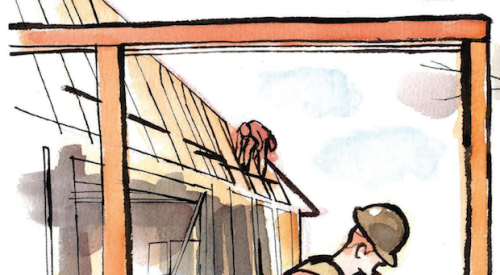|
Heather McCune's Editorial Archives
|
GIANTS Tim Eller, president and CEO of Centex Homes, and Chad Dryer, president and CEO of The Ryland Group were part of a recent panel that examined issues facing the home building industry. Their comments on the issues facing builders today and tomorrow follow.
Interest Rates: "I would take 8.5% for the rest of my life and give up the high side," said Dryer in response to a question regarding moves by the Federal Reserve to slow the economy through higher interest rates. Neither he nor Eller expects any significant drop in sales if interest rates edge up another quarter to half a point. Eller said he pays particular attention to year-over-year consumer traffic patterns and sales rates; both have continued strong through several moves by the Fed. "If mortgage rates stay below 10% and the economic expansion holds, we're in good shape."
Public Vs. Private: "If you're a private home building company now, that is a nice spot to be in," said Dryer. The stock prices of public home builders like Ryland and Centex has remained absurdly low despite years of record sales and profits. Wall Street, in valuing builder stocks, is still applying the old five up/five down economic cycle because that is what history dictates. Frustrated builders like Centex and Ryland can point to demographic, geographic and economic data that suggests the boom-and-bust housing model no longer applies in today's economy, "but that's all we can do." Ryland recently took another step and bought back 400,000 shares of its own stock .
Growth Issues: Several issues impact a builder's opportunity to grow profitably. The most urgent are:
Internet Opportunities: The Internet is the second most important marketing channel today, said both Eller and Dryer. Thirty to 40 percent of new home buyers come into a sales center with something they have downloaded off the web-floor plans, community information, option lists, etc. The effect of this new communication medium, explained Eller, is a compressed sales process. "We've eliminated two to three weeks in the sales process. Our people can be much more productive."
The Internet also is changing the material supply chain in the residential construction industry. Both Centex and Ryland are part of a group of the largest home builders who are aggregating their material purchases to "create something that is builder friendly and builder focused," said Eller. "We're seeking to level the playing field, and this is important. No one knows what the supply chain is going to look like in the next five years and we want to be able to influence the process-and the result."
Consolidation: Home building is today and likely will remain the most fragmented industry in America, said both CEOs. Does that mean there won't be more mergers and acquisitions? Hardly. "Consolidation is inevitable," explains Eller. "The mantra for public companies is growth and this growth has been fueled by acquisitions. Yet even with more consolidation at the top among the largest builders, we will remain wildly fragmented.
"This is an industry where it's important not to lose focus on the basics of the business-buying land and building houses-and you don't have to be big to do those things well."
Heather McCune is the Editor-in-Chief for Professional Builder and Luxury Home Builder. Please email her with any comments or questions regarding her column.












